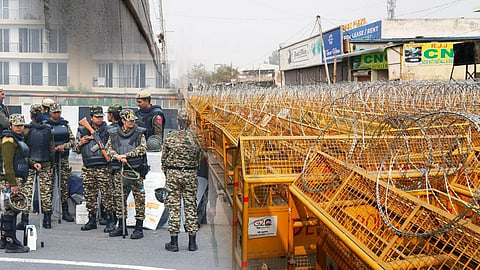

The ongoing farmers' protest, dubbed the "Delhi Chalo" movement, has become a significant concern for the BJP government at the Centre, particularly with the Lok Sabha elections looming on the horizon.
The manner in which the central government is handling and suppressing the protest has raised eyebrows and sparked criticism.
In 2020, tens of thousands of farmers converged on the national capital, demanding the repeal of three contentious farm laws introduced by the Narendra Modi-led BJP government. Tragically, about 700 farmers lost their lives during the prolonged struggle.
Despite the central government's initial reluctance to repeal the laws, it eventually intervened and withdrew all three legislations.
However, while offering assurances to representatives of the protesting farmers' organizations, the government fell short of fully addressing their demands.
Dissatisfied with the partial resolutions, the farmers are once again marching towards Delhi, demanding the fulfillment of their demands.
More than 200 farmer organizations have rallied behind the Kisan Agitation 2.0, with farmers from Punjab, Haryana, Uttar Pradesh, and other states joining the protest and converging on Delhi.
Tens of thousands of farmers are en route to Delhi using various modes of transportation, including tractors, cars, motorcycles, and water tankers. Despite efforts by the Haryana Police and security forces to impede their progress by erecting iron bars and concrete barricades, the farmers are determined to press on.
Facing roadblocks and barricades, the farmers are forging ahead through fields and rivers, equipped with tractors capable of removing obstacles.
In response, authorities have resorted to firing tear gas shells at the protesters, escalating tensions.
Despite these obstacles, farmers continue to protest at the borders of Delhi, prompting authorities to close metro station gates as a precautionary measure.
The escalating standoff between police and farmers at the Punjab-Haryana border has resulted in clashes, transforming the area into a battlefield.
Criticism has been leveled at the government for treating farmers, who are the backbone of the nation's food supply, as terrorists.
Farmer organizations have condemned the use of force and tear gas shells, labeling it a shameful act and a dark day in India's history. In a bid to counter police drones, farmers have resorted to flying kites.
"The act of firing tear gas shells on farmers is shameful. They also throw it with a drone. It is a black day in the history of India," the farmer organisations said.
Farmers have resorted to kite flying to thwart the police drone attempt.
The farmers' agitation began a year after the BJP government came to power for the second time at the Centre. But now the parliamentary elections are just a couple of months away.
The BJP fears that if the farmers protest in Delhi, it will be a major setback for them. That is why it is making every effort to stop farmers from coming to Delhi.
The farmers have presented a 12-point demand list, which includes the enactment of a law guaranteeing a minimum support price for all crops, fixing agricultural produce prices, waiving crop loans for farmers and farm laborers, repealing the Electricity Bill, 2020, and safeguarding land, forests, and water resources belonging to tribals, as recommended by the MS Swaminathan Commission report.
Despite initial talks between three Union ministers and farmer representatives, discussions failed due to the government's failure to fully address the farmers' demands. Subsequently, the farmers launched the 'Delhi Chalo' agitation.
As the BJP government recently presented a white paper in Parliament, activists are calling for a similar document detailing the 2020 farmers' agitation and the unfulfilled promises made during negotiations. The question remains: Will the Modi government heed this call for transparency and accountability?
This copy was originally written Journalist by A Palaniappan and appeared in vikatan.com. Here is the english reversion.